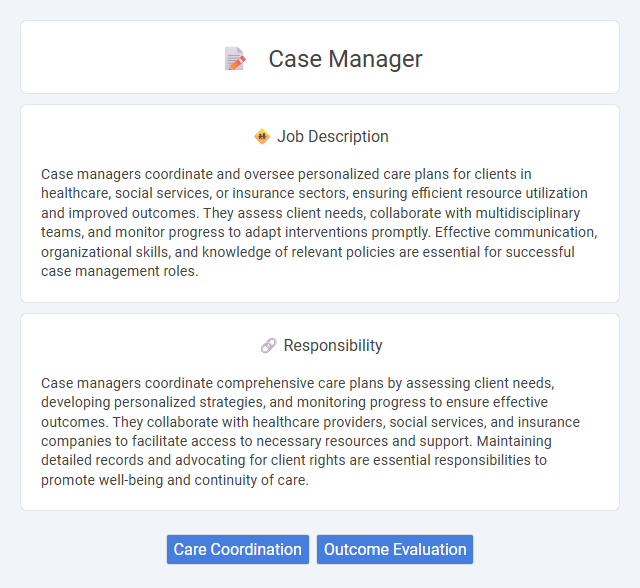
Case managers coordinate and oversee personalized care plans for clients in healthcare, social services, or insurance sectors, ensuring efficient resource utilization and improved outcomes. They assess client needs, collaborate with multidisciplinary teams, and monitor progress to adapt interventions promptly. Effective communication, organizational skills, and knowledge of relevant policies are essential for successful case management roles.
Individuals with strong organizational skills and empathy will likely be suitable for a case manager role, as the job demands coordinating resources for people facing complex life challenges. Those uncomfortable with high-pressure situations or managing multiple cases simultaneously may find it difficult to thrive in this position. Candidates who excel in communication and problem-solving probably have a higher chance of success in meeting client needs effectively.
Qualification
Case managers typically require a bachelor's degree in social work, nursing, or a related field, with many positions favoring candidates who hold a master's degree or specific certifications such as Certified Case Manager (CCM). Essential qualifications include strong communication skills, critical thinking, and proficiency in assessment, planning, and coordination of client services. Experience in healthcare, mental health, or social services sectors enhances a candidate's ability to effectively navigate complex care systems and advocate for client needs.
Responsibility
Case managers coordinate comprehensive care plans by assessing client needs, developing personalized strategies, and monitoring progress to ensure effective outcomes. They collaborate with healthcare providers, social services, and insurance companies to facilitate access to necessary resources and support. Maintaining detailed records and advocating for client rights are essential responsibilities to promote well-being and continuity of care.
Benefit
Case manager jobs probably offer significant benefits, including comprehensive health insurance and retirement plans that support long-term financial security. Employees may experience flexible work schedules designed to enhance work-life balance, which can reduce stress and increase job satisfaction. Access to professional development opportunities likely promotes career growth and skill enhancement in the healthcare or social services sector.
Challenge
A Case manager job likely involves navigating complex client needs and coordinating multiple services, which can present significant challenges. Managing high caseloads and addressing diverse issues such as healthcare, housing, and social support requires strong problem-solving skills. There is a probability of encountering emotionally taxing situations that demand resilience and effective communication.
Career Advancement
Case managers often advance their careers by obtaining specialized certifications such as Certified Case Manager (CCM) or Licensed Clinical Social Worker (LCSW), which enhance their expertise and marketability. Gaining experience in healthcare settings, mental health, or social services increases eligibility for supervisory or administrative roles. Pursuing advanced degrees in social work, nursing, or healthcare administration further positions case managers for leadership opportunities and higher salary brackets.
Key Terms
Care Coordination
Case managers play a crucial role in care coordination by organizing and managing patient services across multiple healthcare providers to ensure seamless treatment plans. They assess patient needs, develop individualized care plans, and facilitate communication among doctors, specialists, and support services to improve health outcomes. Efficient care coordination by case managers reduces hospital readmissions and enhances patient satisfaction through personalized, continuous care management.
Outcome Evaluation
Case managers specialize in outcome evaluation by systematically assessing client progress against established goals to ensure effective service delivery and support. They utilize data-driven methodologies to monitor treatment plans, identify barriers, and adjust interventions, maximizing client well-being and resource efficiency. Accurate outcome evaluation in case management enhances accountability, informs policy development, and supports continuous improvement in care coordination.
 kuljobs.com
kuljobs.com